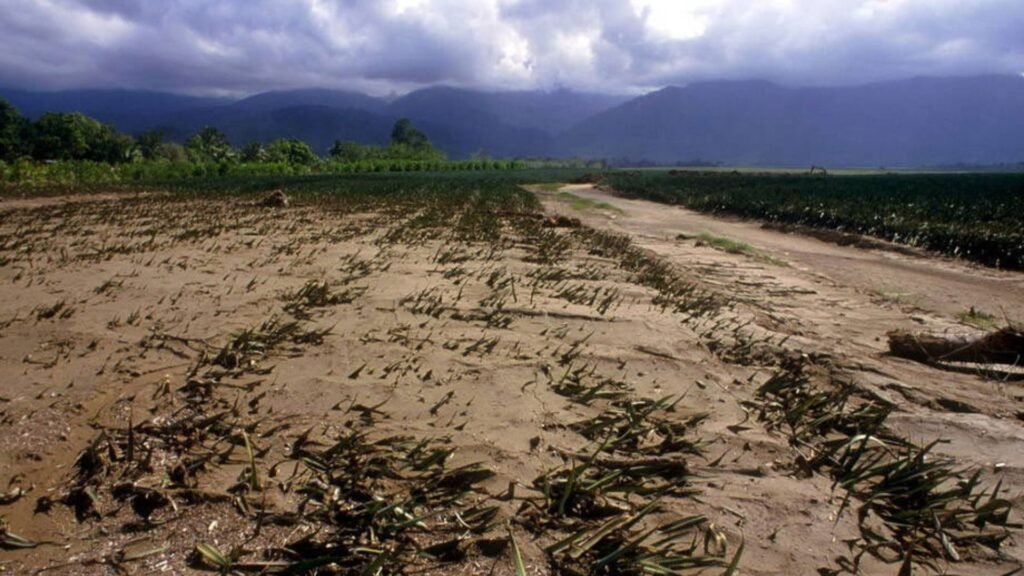|
Getting your Trinity Audio player ready...
|
Climate change is seriously impacting the food we grow and eat. The way our weather behaves is changing, causing problems for farmers and affecting the amount and quality of the food we produce. In this article, we’ll look at how climate change is making it harder for us to grow and get the food we need and explore some ideas on what we can do about it.

Changes in Weather and Crops
One big problem caused by climate change is that the weather is acting differently. Sometimes it rains too much, sometimes not enough, and the temperatures can be extreme. This is making it tough for farmers to know when to plant and harvest their crops, which affects how much food they can produce.
Different Times to Grow and Different Kinds of Crops
Climate change is also making the times when crops grow shift around. Some crops that used to do well in certain areas are struggling because the weather isn’t what it used to be. This means farmers have to find new ways to grow the food they like.
Not Enough Water and Problems with Watering Crops
Because the weather is acting strangely, there’s not always enough water for crops. Water is super important for crops to grow well. Farmers are having a hard time figuring out how to water their crops in a way that doesn’t waste water. Hence, they’re trying new things like drip irrigation and collecting rainwater to help.
Too Hot for Animals on Farms
Climate change doesn’t just affect crops; it also makes it too hot for animals on farms. Farmers are trying to help by keeping animals cool and choosing types of animals that can handle the heat better.
More Bugs and Sickness in Crops
We’re also seeing more bugs and diseases in crops because of climate change. Warmer weather and different rain patterns create a good environment for bugs and diseases to spread. Hence, farmers have to work harder to keep their crops safe, sometimes using chemicals to protect them.
Farmers Changing How They Farm
Additionally, farmers are adapting to these challenges caused by climate change. They’re trying new ways of growing crops and using different types of seeds that can handle the weather changes. They’re also using techniques like not planting the same crop in the same place every year to keep the soil healthy.
Problems Around the World and Our Food
Climate change doesn’t just stay in one place; it affects the whole world. Problems in one area can cause food prices to go up everywhere. To make sure everyone has enough to eat, countries need to work together. Hence, this means sharing knowledge and making rules that help everyone.
Using Technology to Help Farming
Technology is also playing a big part in helping farmers deal with climate change. Farmers are using tools like satellites to understand the weather better. Hence, this helps them decide when to plant and harvest, so they can grow more food.
Everyone Working Together
To tackle the challenges caused by climate change, we all need to work together. This means communities, governments, and organizations sharing ideas and making plans. By working together, we can create ways of growing food that can handle the changes in our climate.
Water Woes and Smart Irrigation Solutions
Moreover, limited water is a big issue due to climate change. Water is vital for crops, but erratic rainfall makes it hard to plan. Farmers are trying smarter irrigation methods, like drip systems and rainwater collection, to ensure crops get enough water without wasting it.
Livestock Concerns and Heat-Resistant Breeds
Animals on farms face stress from the increasing heat. Farmers are choosing animal breeds that can handle higher temperatures and implementing cooling measures to ensure livestock stays healthy and productive.
Pests and Diseases on the Rise
Furthermore, warmer weather creates a playground for bugs and diseases that harm crops. Farmers are working extra hard to protect their crops, sometimes using natural methods to keep them healthy without relying on chemicals.
Adapting Farming Practices for Sustainability
Farmers are adapting by trying out new and more sustainable farming methods. They’re using tricks like rotating crops and picking different types of seeds to cope with the unpredictable weather and keep the soil healthy.
Global Impact on Food Prices
Additionally, climate change isn’t a local problem; it affects the whole world. Problems in one area can lead to higher food prices everywhere. To make sure everyone has enough to eat, countries need to cooperate by sharing ideas and creating rules that help everyone.
Technology in Agriculture
Technology is becoming crucial in dealing with climate change. Farmers are using tools like satellites and weather forecasts to make smart decisions about when to plant and harvest. Hence, ensuring a better chance at growing more food.
Conclusion
In conclusion, climate change is making it harder to grow the food we need. But by trying new ways of farming, using technology, and working together, we can find solutions. It’s important to make sure everyone has enough to eat, even with the challenges that climate change brings.
You may find this information useful:
Best Techniques for Agri Food Health Soil Health Improvement
Farmer’s Markets: A Paradise for Agri-Food Enthusiasts
Easy-to-grow Veggies for Beginners
Organic Farming and its Benefits

